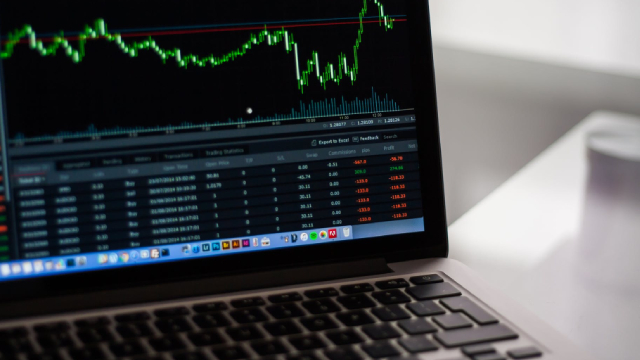US Stock Futures Dive as Tariff Concerns Persist: An In-depth Analysis
As the sun rises on Wall Street, US stock futures are painting a grim picture for the day ahead. The futures for the S&P 500 (ES=F), the Nasdaq 100 (NQ=F), and the Dow Jones Industrial Average (YM=F) are all experiencing significant declines, with the S&P 500 futures dropping by more than 0.5% as of this writing. The cause for this market downturn can be attributed to a brewing storm of tariff concerns and economic forecasts that are casting a shadow over investor sentiment.
Rising Tariffs: A Double-Edged Sword
Tariffs, which are essentially taxes on imported goods, have been a hot topic in the financial world for quite some time now. The ongoing trade tensions between the United States and China have led to a series of tit-for-tat tariff increases, with each side imposing levies on billions of dollars worth of goods. This back-and-forth has resulted in increased uncertainty in the markets, as businesses and investors grapple with the potential consequences of these protectionist measures.
One of the most significant concerns is the impact of tariffs on corporate earnings. Many companies, particularly those in the manufacturing sector, have reported lower profits due to increased production costs. For instance, Caterpillar, a leading construction equipment manufacturer, recently announced that its earnings would be lower than expected due to tariffs. This news sent shockwaves through the markets, with the company’s stock price plummeting by more than 5%.
Economic Forecasts: A Looming Recession?
Another factor contributing to the market unease is the economic forecasts that have emerged in recent weeks. The International Monetary Fund (IMF) has downgraded its global growth forecast for 2019, citing trade tensions and rising interest rates as major factors. The IMF now expects the global economy to grow by 3.5% in 2019, down from its previous estimate of 3.7%.
Moreover, some economists have warned of a potential recession, with the yield curve between the 10-year and 2-year Treasury notes inverting earlier this year. An inverted yield curve has historically been a reliable indicator of an impending recession. This news has further fueled investor anxiety, with many opting to sell off their stocks in anticipation of a market downturn.
Impact on Individuals: A Wait-and-See Approach
So, what does all of this mean for the average investor? It’s important to remember that the markets can be volatile, and short-term declines do not necessarily indicate a long-term trend. That being said, it’s a good idea to take a wait-and-see approach and keep a close eye on your investments. If you’re considering making any major moves, it may be wise to consult with a financial advisor.
Impact on the World: A Global Economic Slowdown
The ripple effects of these market developments are being felt around the world. Many emerging markets, which are heavily reliant on exports, are experiencing currency depreciation and decreased economic activity. For instance, the Indian rupee has hit a record low against the US dollar, while the South African rand has also weakened significantly. Moreover, the economic slowdown in China, which is the world’s second-largest economy, could have far-reaching consequences.
In conclusion, the current state of the markets is a reminder of the interconnected nature of the global economy. Tariffs and economic forecasts are just two of the many factors that can impact investor sentiment and corporate earnings. As always, it’s important to stay informed and to adopt a long-term perspective when it comes to your investments. Remember, the markets are subject to volatility, and short-term declines do not necessarily indicate a long-term trend.
- US stock futures are experiencing significant declines, with the S&P 500 futures dropping by more than 0.5%.
- Tariff concerns and economic forecasts are casting a shadow over investor sentiment.
- Tariffs have led to increased uncertainty in the markets, with many businesses and investors grappling with the potential consequences.
- The International Monetary Fund (IMF) has downgraded its global growth forecast for 2019, citing trade tensions and rising interest rates as major factors.
- An inverted yield curve has historically been a reliable indicator of an impending recession.
- The ripple effects of these market developments are being felt around the world, with many emerging markets experiencing currency depreciation and decreased economic activity.





